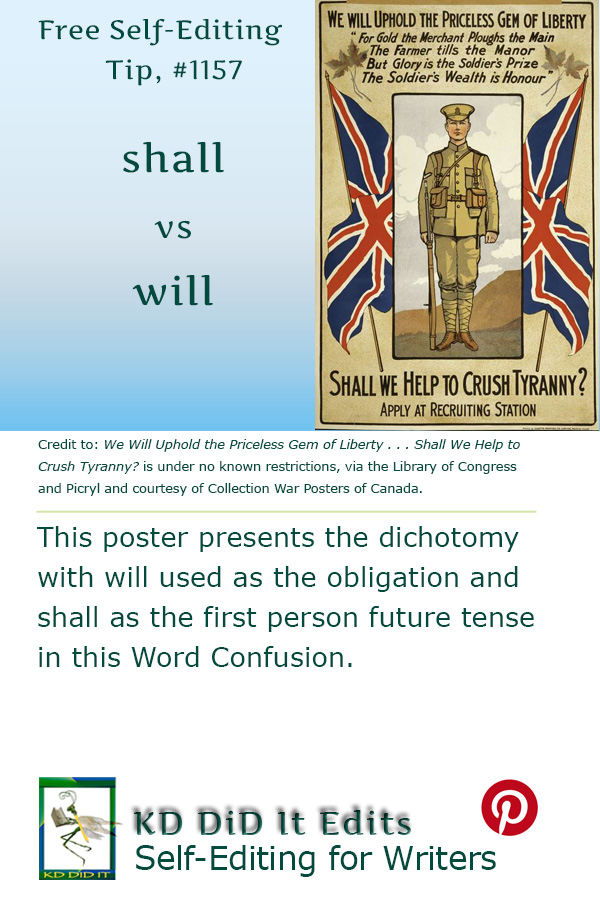I haven’t encountered this word confusion — shall vs will — very often. And yet, I shall dive into this with a will.
Today, shall and will are fairly interchangeable and an acceptable part of standard US and British English. Partly because shall or will are usually contracted: we’ll, she’ll, I’ll. Partly because shall is rarely used — it feels too formal.
Traditionally, shall is used with first person pronouns (I and we) to form the future tense, while will is used with second and third persons (you, he, she, it, they).
I shall be late.
She will not be there.
However, using shall and will is reversed to express a strong determination, command, or obligation to do something.
I will not tolerate this.
You shall go to school.
Word Confusions . . .
. . . started as my way of dealing with a professional frustration with properly spelled words that were out of context in manuscripts I was editing as well as books I was reviewing. It evolved into a sharing of information with y’all. I’m hoping you’ll share with us words that have been a bête noire for you from either end.
If you found this post on “Shall versus Will” interesting, consider subscribing to KD Did It, if you’d like to track this post for future updates.
| Shall | Will |
|---|---|

Thou Shalt Not Kill by i4p4n is under the CC0 1.0 license, via OpenClipArt. |

Quotation: “Careful, or You Will End Up in My Novel” by Ken Whytock is under the CC BY-NC 2.0 license, via Flickr. |
| Part of Grammar: | |
| Verb, modal
Second person singular verb: shalt, shalt [archaic]
Third person present verb: shall |
Noun 1; Verb 1, intransitive & transitive Plural for the noun: wills 1 Gerund: willing 1 Third person present verb: wills Past tense or past participle: willed Present participle: willing Verb, modal 2 Third person present verb: will, wilt [archaic] 2 Past tense: would; wouldst, wouldest [archaic] 2 Past participle: would, wold [obsolete] 2 |
| [In the first person] Expressing the future tense
Expressing a strong assertion or intention Expressing an instruction or command Used in questions indicating offers or suggestions Used before a verb in the infinitive to show:
[Archaic] To be able to
|
Noun: [Usually in singular noun] The faculty by which a person decides on and initiates action
A legal document containing instructions as to what should be done with one’s money and property after one’s death Verb, modal: Disposed or willing to Expected or required to May be expected or supposed to Determined or sure to (used emphatically) Accustomed to, or do usually or often Habitually disposed or inclined to Capable of
Going to Verb, intransitive:
Verb, transitive: [Formal or literary] Intend, desire, or wish (something) to happen [will something to] Bequeath something to (someone) by the terms of one’s will
|
| Examples: | |
| This time next week I shall be in Scotland.
They shall succeed. You shall not frighten me out of this. You shall not steal. You shall leave now. He shall answer for his misdeeds. The penalty shall not exceed two years in prison. Shall I send you the book? Shall we go? We shall arrive tomorrow. I shall go out if I feel like it. That day shall come. |
Noun: She has an iron will. It was a battle of wills between children and their parents. It was an act of will. She made a stupendous effort of will. Jane had not wanted them to stay against their will. She lacked the will to live. The disaster was God’s will. Have you made out your will yet? Verb, modal: She will see you at dinner. People will do right. You will report to the principal at once. You will not have forgotten him. This will be right. You would do it. People will talk. You will often see her sitting there. He would write for hours at a time. Boys will be boys. After dinner they would read aloud. This tree will live without water for three months. I will bid you “Good night.” Verb, intransitive: Ask, if you will, who the owner is. Do as you will. Verb, transitive: She stared into the fog, willing it to clear. Their friendship flourished particularly because Adams willed it. He was doing what the saint willed. His father willed the farm to Mr. Timms. He willed that his body be given to the hospital. |
| History of the Word: | |
| Old English sceal is of Germanic origin and related to the Dutch zal and the German soll, from a base meaning owe. |
|
C’mon, get it out of your system, bitch, whine, moan . . . which words are your pet peeves? Also, please note that I try to be as accurate as I can, but mistakes happen or I miss something. Email me if you find errors, so I can fix them . . . and we’ll all benefit!
Satisfy your curiosity about other Word Confusions on its homepage or more generally explore the index of self-editing posts. You may also want to explore Book Layout & Formatting Ideas, Formatting Tips, Grammar Explanations, Linguistics, Publishing Tips, the Properly Punctuated, Writing Ideas and Resources, and Working Your Website.
Resources for Shall versus Will
Apple Dictionary.com
The Free Dictionary: shall
Pinterest Photo Credits:
We Will Uphold the Priceless Gem of Liberty . . . Shall We Help to Crush Tyranny? is under no known restrictions, via the Library of Congress and Picryl and courtesy of Collection War Posters of Canada.


